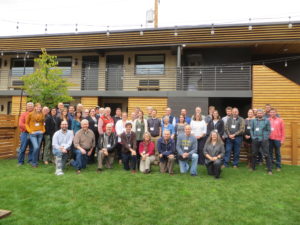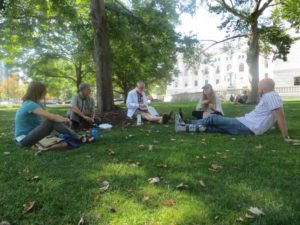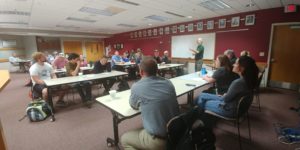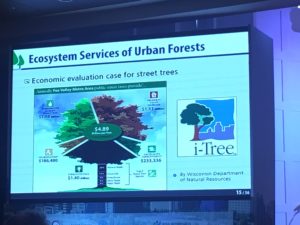 The Urban Forestry Council held their most recent quarterly meeting on October 13 at The Oxbow Hotel in Eau Claire. This was the second time the Wisconsin Council met with their colleagues in Minnesota, board members from the Minnesota Shade Tree Advisory Committee and MN DNR urban forestry staff. In addition, they were joined by Urban Forestry Council members from several additional states: Indiana, Iowa, and Michigan. The Wisconsin Urban Forestry Council and Wisconsin DNR were pleased to welcome these urban forestry representatives from the region for the meeting. Continue reading “Wisconsin Urban Forestry Council meeting”
The Urban Forestry Council held their most recent quarterly meeting on October 13 at The Oxbow Hotel in Eau Claire. This was the second time the Wisconsin Council met with their colleagues in Minnesota, board members from the Minnesota Shade Tree Advisory Committee and MN DNR urban forestry staff. In addition, they were joined by Urban Forestry Council members from several additional states: Indiana, Iowa, and Michigan. The Wisconsin Urban Forestry Council and Wisconsin DNR were pleased to welcome these urban forestry representatives from the region for the meeting. Continue reading “Wisconsin Urban Forestry Council meeting”
Urban wood
Healthcare facilities using green spaces to help in healing
Imagine taking a relaxing walk in a wooded area, listening to the sounds of wind through trees, birds, and water running down a stream and seeing beautiful, vibrant shade of green. This type of an environment has shown numerous benefits, from cleaner air and water to increased health benefits like reduced stress and blood pressure. Continue reading “Healthcare facilities using green spaces to help in healing”
2017 Urban and Community Forestry Questionaire
This month, nearly 700 communities across the state will receive a request in the mail to complete a questionnaire for an important project to determine the current management of community tree populations in Wisconsin. The study is being jointly conducted and sponsored by the University of Wisconsin – Stevens Point, the Wisconsin Department of Natural Resources Urban & Community Forestry Program, and the USDA Forest Service. It serves to provide important information for the state program since the last community survey in 2008 and as a student project at UW – Stevens Point.
Continue reading “2017 Urban and Community Forestry Questionaire”
Hoppe Tree Service partners with Brown Deer High School to utilize urban wood
This fall semester, students at Brown Deer High School won’t have to worry about whether or not they have enough lumber supplies and project ideas to perform during their Industrial Arts Wood Shop classes. This is thanks to a partnership between the school and Hoppe Tree Service. The partnership centers around the concept of using locally sourced urban wood from Hoppe Tree Service’s Urban Wood Lab Store. The agreement not only provides lumber for the school, but also allows the student’s non-profit “business” to earn money by processing wood and creating crafts that Hoppe’s Urban Wood Lab Store can then sell to consumers. Continue reading “Hoppe Tree Service partners with Brown Deer High School to utilize urban wood”
Conversations about the Wisconsin Community Tree Map
The following article was written by Elizabeth Dierickx, Marketing Specialist at Plan-It Geo, LLC, based on conversations she has had with DNR staff members.
I recently had the pleasure of sitting down with Dan Buckler, DNR Urban Forest Assessment Specialist and Laura Lorentz, DNR Urban Forestry Policy & Partnership Specialist to talk about Wisconsin’s new Community Tree Map. This exciting tool has brought a lot of new excitement and opportunity to the states community forests; the Community Tree Map has the potential to assists the urban forestry team in developing policies based on data driven analysis, has given them a better tool to make recommendations, and helped to create awareness about the urban forest with community members and decision makers. Continue reading “Conversations about the Wisconsin Community Tree Map”
Minnesota DNR Urban Forestry visits Wisconsin
 The Urban Forestry team hosted Valerie McClannahan from the Minnesota DNR on September 25th and 26th. Valerie was particularly interested in our Urban Forest Assessment program, the urban wood industry in Wisconsin, and general programmatic items. During her visit, we highlighted the Wisconsin Community Tree Map and the Capital Park inventory, our UFIA program, our canopy assessment project, and the urban homeowner survey. She is interested in how Minnesota can leverage some of their existing work and incorporate some of the additional pieces we are developing for statewide assessments. Continue reading “Minnesota DNR Urban Forestry visits Wisconsin”
The Urban Forestry team hosted Valerie McClannahan from the Minnesota DNR on September 25th and 26th. Valerie was particularly interested in our Urban Forest Assessment program, the urban wood industry in Wisconsin, and general programmatic items. During her visit, we highlighted the Wisconsin Community Tree Map and the Capital Park inventory, our UFIA program, our canopy assessment project, and the urban homeowner survey. She is interested in how Minnesota can leverage some of their existing work and incorporate some of the additional pieces we are developing for statewide assessments. Continue reading “Minnesota DNR Urban Forestry visits Wisconsin”
UW Forestry students visit DNR
 On Wednesday, October 4th UW-Madison students from the Forestry program visited the DNR. About 16 students attended an informational session on the Division of Forestry which highlighted a few of our programs. Continue reading “UW Forestry students visit DNR”
On Wednesday, October 4th UW-Madison students from the Forestry program visited the DNR. About 16 students attended an informational session on the Division of Forestry which highlighted a few of our programs. Continue reading “UW Forestry students visit DNR”
Wisconsin efforts highlighted across the world
 On September 13th, the 2nd ‘Asia Pacific Urban Forestry Meeting’ was held in Seoul, South Korea. Asia is home to a large urban population that continues to grow, almost depleting many natural resources. This meeting was hosted to share industry knowledge on how well-managed forests and urban green spaces can help relieve many of the socio-economical stresses while creating a more sustainable and resilient urban environment. This year’s meeting was focused on developing an Action Plan to “guide countries toward the sound implementation of urban forestry in the region.”
On September 13th, the 2nd ‘Asia Pacific Urban Forestry Meeting’ was held in Seoul, South Korea. Asia is home to a large urban population that continues to grow, almost depleting many natural resources. This meeting was hosted to share industry knowledge on how well-managed forests and urban green spaces can help relieve many of the socio-economical stresses while creating a more sustainable and resilient urban environment. This year’s meeting was focused on developing an Action Plan to “guide countries toward the sound implementation of urban forestry in the region.”
Continue reading “Wisconsin efforts highlighted across the world”
UW-Extension and other trainings available
UW-Extension will be hosting fall workshops on tree pruning. This is a one-day workshop will show parks and tree professionals how to properly prune trees, from new tree training to mature tree maintenance, to create a strong enduring structure, maintain vigor, and achieve specific municipal objectives. The workshop will include classroom instruction on pruning fundamentals and outdoor, hands-on demonstration of personal protective equipment along with pruning methods and techniques. These workshops are being help in various locations: Oshkosh, Waukesha, Kenosha, Stevens Point, Eau Claire and Madison. Information about these events and other urban events is posted on the Urban Forestry training and events webpage.
For more information contact Ellen Clark (EllenA.Clark@Wisconsin.gov), Urban Forestry Communication Specialist, at 608-267-2774.
Capitalizing on the Wisconsin Community Tree Map
The Wisconsin Community Tree Map is an accessible database of tree inventories compiled into an interactive and easy to use map based program, to encourage and engage awareness of the composition and benefits of urban trees. Continue reading “Capitalizing on the Wisconsin Community Tree Map”
